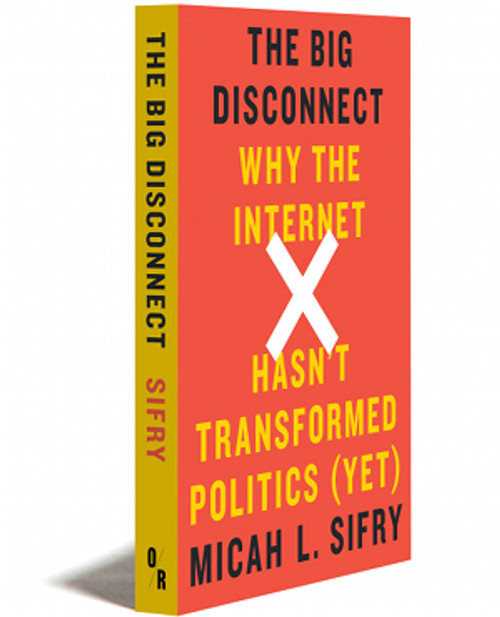The Big Disconnect
"The Internet seems to be better at saying 'stop' than it is at saying 'go.' In this urgent overview of a decade of experiments in online organizing, Micah Sifry shows us what happened and lays out what's next"
- Seth Godin"No one better grasps the interplay between innovative media technology and politics than Micah Sifry"
- Kevin Phillips"A leading participant in and observer of how the Internet is changing politics and society."
- Katrina vanden Heuvelabout the bookabout
Now that communication can be as quick as thought, why hasn't our ability to organize politically—to establish gains and beyond that, to maintain them—kept pace? The web has given us both capacity and speed: but progressive change seems to be something perpetually in the air, rarely manifesting, even more rarely staying with us.
Micah L. Sifry, a longtime analyst of democracy and its role on the net, examines what he calls "The Big Disconnect". In his usual pithy, to-the-point style, he explores why data-driven politics and our digital overlords have failed or misled us, and how they can be made to serve us instead, in a real balance between citizens and state, independent of corporations.
The web and social media have enabled an explosive increase in participation in the public arena—but not much else has changed. For the next step beyond connectivity, writes Sifry, "we need a real digital public square, not one hosted by Facebook, shaped by Google and snooped on by the National Security Agency. If we don't build one, then any notion of democracy as 'rule by the people' will no longer be meaningful. We will be a nation of Big Data, by Big Email, for the powers that be".
About The Author / Editor
Preview
On the left, the open Internet and connection technologies have given anti-war and pro-civil liberties dissidents like writer Glenn Greenwald a standing and reach that, if we had a multi-party political system, would surely be rewarded with a healthy segment of the popular vote. And Occupy Wall Street, which was organized almost entirely outside the contours of "normal" American politics by anarchists inspired by the protest movements of Europe and the Arab Spring, was able to briefly upend the political debate and focus attention on inequality in America, a topic the two major parties uniformly ignore.
But the central contours of American politics really haven't changed all that much in the ten years since the rise of "people-powered" campaigns, big e-groups like MoveOn, online fundraising hubs like ActBlue, blogs and social media. The political operating system of big money campaigns, gerrymandered districts, discriminatory ballot access rules favoring the major parties, largely undisclosed lobbying, and winner-takes-all first-past-the-post representation hasn’t been altered in the slightest. Consider these sobering facts:
In 2004, the average cost of winning a seat in the U.S. House of Representatives was $1.26 million (in inflation-adjusted 2012 dollars), according to the Campaign Finance Institute. In 2012 it had risen to $1.6 million. On the Senate side, the average winning campaign cost $8.7 million in 2004; in 2012 that had risen to $10.4 million.[1]
If the Internet was democratizing electoral politics, then small donors would be stepping up and playing a bigger role in helping candidates clear these tougher thresholds. But on the whole they aren't. In the 2004 cycle, just eight percent of the money given to House candidates came from donors giving less than $200. In 2012, that percentage had inched up to just ten percent. Big donors (those who give more than $1000) and PACs still mattered far more to House candidates, delivering a whopping 71% of all the money raised in 2012 (which was, in fact, more than in 2004).[2] On the Senate side, the percentage of money going to candidates from donors giving less than $200 didn't change at all: it was 17% in 2004 and 17% in 1012.[3]
in the media
The Big Disconnect
"The Internet seems to be better at saying 'stop' than it is at saying 'go.' In this urgent overview of a decade of experiments in online organizing, Micah Sifry shows us what happened and lays out what's next"
- Seth Godin"No one better grasps the interplay between innovative media technology and politics than Micah Sifry"
- Kevin Phillips"A leading participant in and observer of how the Internet is changing politics and society."
- Katrina vanden Heuvelabout the bookabout
Now that communication can be as quick as thought, why hasn't our ability to organize politically—to establish gains and beyond that, to maintain them—kept pace? The web has given us both capacity and speed: but progressive change seems to be something perpetually in the air, rarely manifesting, even more rarely staying with us.
Micah L. Sifry, a longtime analyst of democracy and its role on the net, examines what he calls "The Big Disconnect". In his usual pithy, to-the-point style, he explores why data-driven politics and our digital overlords have failed or misled us, and how they can be made to serve us instead, in a real balance between citizens and state, independent of corporations.
The web and social media have enabled an explosive increase in participation in the public arena—but not much else has changed. For the next step beyond connectivity, writes Sifry, "we need a real digital public square, not one hosted by Facebook, shaped by Google and snooped on by the National Security Agency. If we don't build one, then any notion of democracy as 'rule by the people' will no longer be meaningful. We will be a nation of Big Data, by Big Email, for the powers that be".
About The Author / Editor
Preview
On the left, the open Internet and connection technologies have given anti-war and pro-civil liberties dissidents like writer Glenn Greenwald a standing and reach that, if we had a multi-party political system, would surely be rewarded with a healthy segment of the popular vote. And Occupy Wall Street, which was organized almost entirely outside the contours of "normal" American politics by anarchists inspired by the protest movements of Europe and the Arab Spring, was able to briefly upend the political debate and focus attention on inequality in America, a topic the two major parties uniformly ignore.
But the central contours of American politics really haven't changed all that much in the ten years since the rise of "people-powered" campaigns, big e-groups like MoveOn, online fundraising hubs like ActBlue, blogs and social media. The political operating system of big money campaigns, gerrymandered districts, discriminatory ballot access rules favoring the major parties, largely undisclosed lobbying, and winner-takes-all first-past-the-post representation hasn’t been altered in the slightest. Consider these sobering facts:
In 2004, the average cost of winning a seat in the U.S. House of Representatives was $1.26 million (in inflation-adjusted 2012 dollars), according to the Campaign Finance Institute. In 2012 it had risen to $1.6 million. On the Senate side, the average winning campaign cost $8.7 million in 2004; in 2012 that had risen to $10.4 million.[1]
If the Internet was democratizing electoral politics, then small donors would be stepping up and playing a bigger role in helping candidates clear these tougher thresholds. But on the whole they aren't. In the 2004 cycle, just eight percent of the money given to House candidates came from donors giving less than $200. In 2012, that percentage had inched up to just ten percent. Big donors (those who give more than $1000) and PACs still mattered far more to House candidates, delivering a whopping 71% of all the money raised in 2012 (which was, in fact, more than in 2004).[2] On the Senate side, the percentage of money going to candidates from donors giving less than $200 didn't change at all: it was 17% in 2004 and 17% in 1012.[3]







